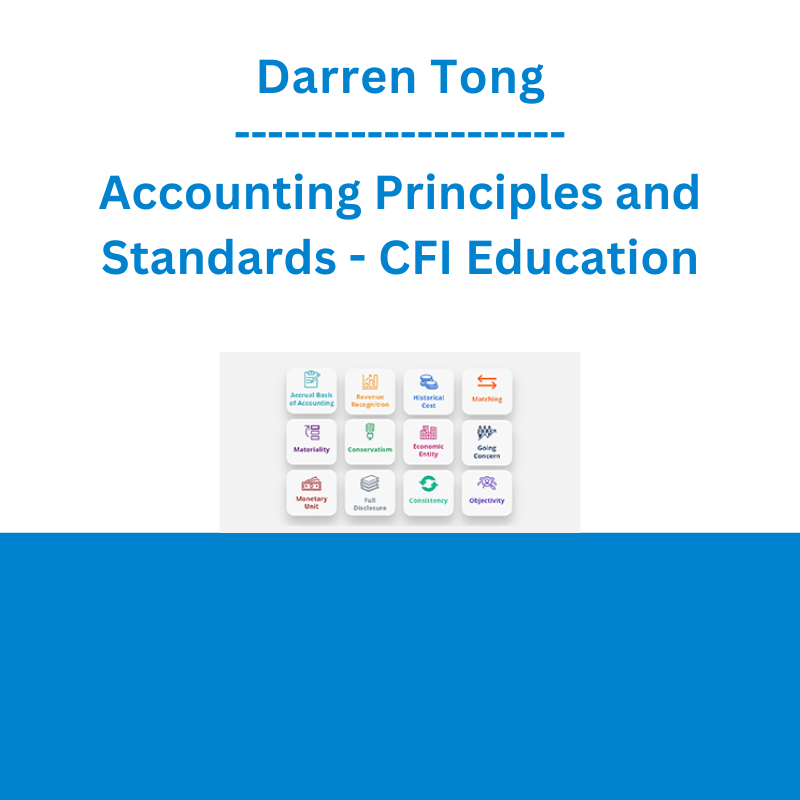*** Proof of Product ***
Exploring the Essential Features of “Darren Tong – Accounting Principles and Standards – CFI Education”
Accounting Principles and Standards
Understanding specific accounting principles and standards is a necessary aspect to becoming a world-class financial professional
- Understand the fundamental accounting principles that underly more detailed accounting standards
- Gain an understanding of revenue recognition and its associated matching principle
- Identify the key standards relating to leases, income taxes, business combinations, and more
Overview
Accounting Principles and Standards Course Overview
This course is designed to give some background on the fundamental accounting principles that underlie accounting standards and explore in more depth, some of the specific accounting standards commonly encountered by financial analysts. A good understanding of accounting standards is essential for reading and interpreting financial statements and in creating robust financial models.
Accounting Principles and Standards Learning Objectives
Upon completing this course, you will be able to:
1. Understand the fundamental accounting principles that underly more detailed accounting standards
2. Understand why it is important to have as well as the characteristics of useful financial information
3. Explain the common accounting standards that financial analysts frequently encounter, such as:
- Accrual basis of accounting
- Revenue recognition principle
- Historical cost principle
- Matching principle
- Materiality principle
- Conservatism principle
- Full disclosure principle
4. Identify the key standards when accounting for leases, incomes taxes, share-based payments, business combinations, and transactional costs
Who should take this course?
This Accounting Principles and Standards course covers the foundational knowledge every financial analyst should understand to perform sound financial reporting and analysis. Anyone who would like to start a career in investment banking, financial planning and analysis (FP&A), corporate development, equity research, and other areas of corporate finance should take this course to reinforce their accounting knowledge.
What you’ll learn
Accounting Principles Overview
Introduction
Download Course Presentation
The Purpose of Financial Reporting
Fundamental Accounting Principles
Accrual Basis of Accounting Principle
Revenue Recognition Principle
Historical Cost Principle
Matching Principle
Interactive Exercise 1
Materiality Principle
Conservatism Principle
Economic Entity Principle
Going Concern Principle
Monetary Unit Principle
Full Disclosure Principle
Consistency Principle
Objectivity Principle
Interactive Exercise 2
Usefulness of Financial Information
Importance of Useful Financial Information
Enhancing Characteristics
Fundamental Characteristics
Interactive Exercise 3
Detailed Accounting Standards
Detailed Accounting Standards
Accounting For Leases
Leases and Right to Control
Initial Recognition of Balance Sheet Amounts
Subsequent Recognition and Measurement
Finance and Operating Lease Exercise
Accounting For Income Taxes
Accounting Treatment of Income Taxes
Reconciling Accounting Income and Taxable Income
Carrying Amount Versus Tax Base
Temporary Differences
Deferred Tax Assets and Liabilities
Income Tax Exercise
Accounting For Share-based Payments
Introduction to Share-based Payments
Vesting Conditions, Vesting Period, and Fair Value
Interactive Exercise 4
Accounting For Share-based Payments Example 1
Accounting For Share-based Payments Example 2
Share-based Payments Exercise
Accounting For Business Combinations
Introduction to Business Combinations
Identifying Business Combinations and Fair Value Concentration
Interactive Exercise 5
Outputs, Inputs, and Substantive Processes
Interactive Exercise 6
Accounting Treatment For Business Combinations
Recognizing and Measuring Assets Acquired, Liabilities Assumed, and Goodwill
Business Combinations Exercise
Accounting For Financing Fees and Transaction Costs
Introduction to Financing Fees and Transaction Costs
Debt Issuance Costs
Share Issue Costs
Transaction Costs
Financing Fees and Transaction Costs Exercise
Qualified Assessment
Qualified Assessment
Please see the full list of alternative group-buy courses available here: https://lunacourse.com/shop/










 Matan Feldman - The 13-Week Cash Flow Modeling - Wall Street Prep
Matan Feldman - The 13-Week Cash Flow Modeling - Wall Street Prep  George Fontanills & Tom Gentile - Optionetics Wealth Without Worry Course
George Fontanills & Tom Gentile - Optionetics Wealth Without Worry Course  Tej Dosa - Clean Your Inner World- Reprogram Your Mind In 45 Days
Tej Dosa - Clean Your Inner World- Reprogram Your Mind In 45 Days  George Fontanills & Tom Gentile - Optionetics 6 DVD Series Home Study Course (Digital Download)
George Fontanills & Tom Gentile - Optionetics 6 DVD Series Home Study Course (Digital Download)  Sovereign Man Confidential - Renunciation Video
Sovereign Man Confidential - Renunciation Video  Akil Stokes & Jason Graystone - TierOneTrading - Trading Edge 2019
Akil Stokes & Jason Graystone - TierOneTrading - Trading Edge 2019  Megan Auman - Brand Your Creative Business
Megan Auman - Brand Your Creative Business  Jesse Livermore Trading System - Joe Marwood
Jesse Livermore Trading System - Joe Marwood  Robert Glover - The Ruminating Brain: On-Demand Video Course
Robert Glover - The Ruminating Brain: On-Demand Video Course  Forexmentor - Recurring Forex Patterns
Forexmentor - Recurring Forex Patterns  Trade Like Mike - The TLM Playbook 2022
Trade Like Mike - The TLM Playbook 2022  Fred Haug - Virtual Wholesaling Simplified
Fred Haug - Virtual Wholesaling Simplified  Matthew Kratter - Trader University
Matthew Kratter - Trader University  Emanuele Bonanni - My Trading Way
Emanuele Bonanni - My Trading Way  Toshko Raychev - Profit System + ITF Assistant
Toshko Raychev - Profit System + ITF Assistant  Chris Capre - Advanced Price Action Ongoing Training & Webinars
Chris Capre - Advanced Price Action Ongoing Training & Webinars  Greg Loehr - Advanced Option Trading With Broken Wing Butterflies
Greg Loehr - Advanced Option Trading With Broken Wing Butterflies  Megan Auman - Simple Email Marketing for Makers
Megan Auman - Simple Email Marketing for Makers  Pat Basil - Strength Training Program Design Manual
Pat Basil - Strength Training Program Design Manual  Richard Clear - 4oz Moves 1000lbs & Hua Jin
Richard Clear - 4oz Moves 1000lbs & Hua Jin  Oliver Velez - Essential Strategy Of Trade For Life
Oliver Velez - Essential Strategy Of Trade For Life  Bart Ehrman - Lost Christianities: Christian Scriptures and the Battles over Authentication
Bart Ehrman - Lost Christianities: Christian Scriptures and the Battles over Authentication  Writing Great Chapters - Daniel David Wallace
Writing Great Chapters - Daniel David Wallace  Ed Ponsi - Forex Trading
Ed Ponsi - Forex Trading  Racing Workshop - Complete Online Package
Racing Workshop - Complete Online Package  Plotting and Planning Your Novel - Daniel David Wallace
Plotting and Planning Your Novel - Daniel David Wallace  Advanced Content Aware and Cloning - Lisa Carne
Advanced Content Aware and Cloning - Lisa Carne  Team NFT Money - Ultimate NFT Playbook
Team NFT Money - Ultimate NFT Playbook  Mastering Long Exposure Photography - Matt Kloskowski
Mastering Long Exposure Photography - Matt Kloskowski